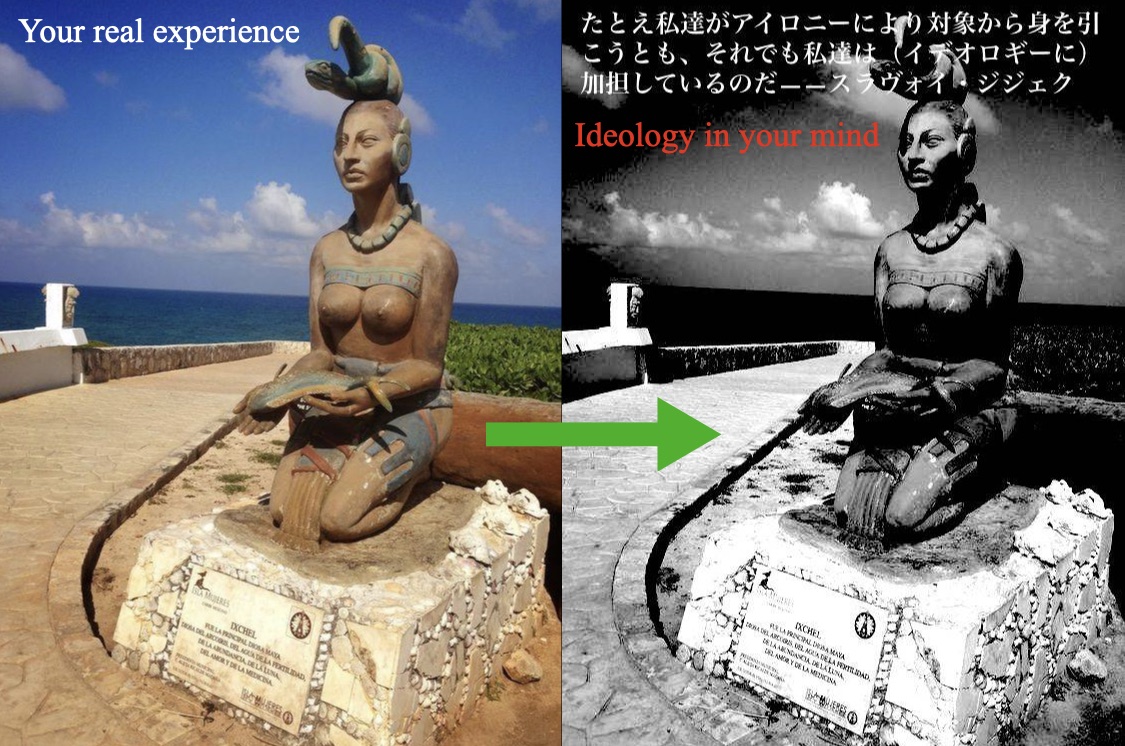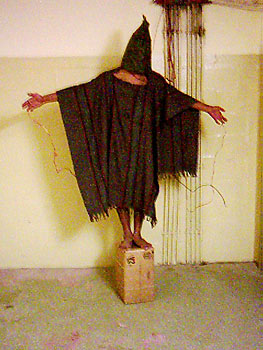
イデオロギー的カテゴリーとしての寛容
Tolerance as an Ideological Category:スラヴォイ・ジジェクの暴力論:05
☆「要するに寛容とは、この〈他者〉が「受け入れ難い原理主義者」でないという限りでの〈他
者〉すなわち本当の意味での〈他者〉ではないという限りでの〈他者〉へ与えられる寛容を意味するにすぎない」(ジジェク 2005:30)
| パラグラフ番号(垂水源之介式) |
ページ |
英文ページ |
ノート |
| 1 |
174 |
119 |
・処方箋としての寛容、批判というとこ
ろか? ・その答えは、リベラル多文化主義者の「政治の文化化」にある。(→多文化主義批判「(経済がもつ普遍的価値への包摂を 促進させるかにみえる)グローバルな状況においても、それぞれの文化が固有の価値をもつことを 称揚するが、その文化的差異は、人種主義(あるいは人種差別思想)が持つような、支配者が被支配者の差異があったまま、その差異を固定化させるようなイデ オロギーとして作用しているのだ、ということ」ジジェク教 授による厄介な多文化主義批判) ・文化的差異を、所与のもの、超克不可能なものとして自然化され、毒を抜かれる ・ジジェク先生の処方箋は、「政治の文化化」から「文化の政治化(poloticalization of culture)」である。 |
| 2 |
175 |
・ハンチントンの「文明の衝突」論の病理 ・フクヤマの「歴史の終わり」も楽観論ながら、ハンチントンと同じと主張。 ・「文明の衝突は、歴史の終わりにおける政治である」 |
|
| 3 |
175-176 |
・フクヤマもハンチントンも、文化をエ
ンジョイしている、文化を自由な選択としている人たちの対立である。 ・野蛮をうむ究極の原因は文化そのものだ、という逆説。 ・《文化を同一化することは、他の文化での不寛容をうむ》テーゼ→これは文化相対主義を掲げる 文化人類学への挑戦とみてよいだろう。 |
|
| 4 |
176 |
・リネベラリズムの中で文化は生き残る
が、それは私的なものとしてである。 ・《文化の聖体変化transubstantiation = transsubstantiatio in Latin》 ・文化は、普遍化には邪魔になるので、主 体(形成において)は文化を欠いているべきだ。 ・これはデカルト的主体、のカントヴァージョンである。 |
|
| 5 |
デカルトの引用、方法序説、谷川訳、
24-25ページ。他者は、我我より理性を働かせることがある。 |
||
| 6 |
「民族」は個人の私的利用において止め
るべきというカント的信念。 ・ローティ:私的領域は、我々のイディオクラシーの空間である。 |
||
| 7 |
177-178 |
・世界=市民=社会という公的空間は、
普遍的シンギュラリティという逆説、単独者としての主体が、特殊性を媒介を迂回して、直接普遍に関与する、短絡現象をさす。 ・私的なものは公的である(→公的領域と私的領域に関する議論) ・The personal is political(個人的なこととは政治的なことのだ!)- Carol Hanisch,(→「はじめてのフェミニズム」) ・カントをローティの批判者として読むべき:「人が本当の意味で普遍的であるのは、共同体的諸々のアイデンティティの狭間にあって、根源的に単独であると きだけである」 ・社会的アイデンティティの縛りの外に出ること。 |
|
| 8 |
179 |
《普遍性の効力》 ・寛容というリベラル概念を疑ってかかる。 ・寛容は、暴力である(説) ・西洋のリベラルは他者の文化の内実(例:陰核切除、子殺し)には不寛容なくせに、自分たちの問題含みの文化の内容(美容整形、妊娠中絶)には寛容であ る。 |
|
| 9 |
・自由選択(主義)の破綻 |
||
| 10 |
180 |
・ヴェールを自分の意思でかぶること
は、西洋で中華料理に行くのと同じ。 ・自由選択をするには、自分の文化から、切り離される、暴力的な過程を経なければな らぬ。 |
|
| 11 |
・この暴力が、社会から個人を解放す
る。 ・アブ・ハニーファ(Abu Hanifa, 699-767)「コミュニティにおける意見の相違は、神の慈悲の現れである」 |
||
| 12 |
・リベラリズムは、果たして限界がある
思想なのか? ・「自身の限界について自己反省する感 性は、リベラリズムによって推進された自律性と合理性の概念があってはじめて可能に なる」 ・「形式は大切であるというヘーゲルの教え」 |
||
| 13 |
・「ほかの文化を不寛容な、あるいは野
蛮なものとして切り捨てる態度の裏側には、ほかの文化の優秀さをやすやすと認める態度がある」(p.182) |
||
| 14 |
183 |
・「このようにリベラリズムに対する
『ラディカルな』ポストコロニアル的な批判は、マルクス主義の標準的なレベルにとどまっている」 ・標準的なポスモは、反本質主義的 ・「実際ここでは、人権の担い手である「人間」は、市民というものに形を与える政治的実践の産物である。 |
|
| 15 |
183-185 |
・普遍的形式のヘゲモニーを支える特殊
内容の同定<普遍性の形式自体の出現に関する問題を提起すること。 ・商品交換とグローバルな市場経済という特定の社会的状況においては抽象化が現実的な社会生活の特徴になるということ。 |
|
| 16 |
・形式は、社会生活に物質的な痕跡を残
すそれ自体の力学を備える(クロード・ルフォール[Claude
Lefort]、ジャック・ランシエール[Jacques
Rancière,]) ・ジャック・ランシエールの自由平等の見かけから、「象徴的効果」を発揮するアイディアをえる。 |
||
| 17 |
187 |
・特殊な生活世界から、普遍性が現れる
こと ・ホメロスの真の問題は、起源を超え て、あらゆる時代に訴えかける力はなぜなのか?その理由を説明することだ。 |
|
| 18 |
・解釈の紋切り型を批判 |
||
| 19 |
189 |
・ニーチェの変身;(α)保守的で高潔
な現ファシスト、(β)フランス的、(γ)カルスタ啓ニーチェ。 ・人権概念の普遍的形式と、本当の意味との間の緊張、それが、人権そのものの一部をなす。ニーチェ(解釈)も同じ。 |
|
| 20 |
190 |
・ブリュメール18のマルクス。 ・誠実な王制主義が、共和主義の空想的な支えとなる |
|
| 21 |
191 |
・理性の狡知 ・特殊性は、普遍性の仮面となる。 ・個人としての資本家は、自分のためだと思っていて、普遍資本の拡大再生産に寄与しているとは思わない。 ・資本主義の魅力でもあるが、とてつもなく、対自的に普遍的であること。 |
|
| 22 |
191 |
・「文化なき普遍性というリベラリズム
の主張』→真理となる。 ・世界を欠くことも資本主義の特徴(バディウ) ・資本主義=普遍性が続く |
|
| 23 |
・我々の文化は我々の問題なので、ケチ
をつけるな、は(普遍性理解がないために)誤
り。 |
||
| 24 |
193 |
・プリモ・レーヴィー |
|
| 25 |
194 |
《冥界を動かさん:地下の領域》 |
|
| 26 |
195 |
・全体主義は、規則の適用の厳格さを強
調するが、実際にはやらない。 ・全体主義は、慈悲の体制。それゆえに、違法行為、賄賂、詐欺が跋扈する。 |
|
| 27 |
196 |
・不文律の複雑な体系 |
|
| 28 |
・ソビエト崩壊後の秩序と「不文律」の
崩壊 |
||
| 29 |
197 |
・命令が、自由意志への質問の形でなさ
れる |
|
| 30 |
198 |
・日本は、有給休暇を与えられるが、そ
れを半分しか使わない。そう期待されているから、がその答え。 |
|
| 31 |
198 |
・競争をして、勝っても、勝利者がそれ
を辞退し、敗北者もそれを辞退し、勝利者が結果的にその地位につくことで、友好的ライバルの関係が維持される。(→互酬性/互酬制) |
|
| 32 |
199-200 |
・ユーゴスラビアの学生新聞の当てこす
り号外 |
|
| 33 |
200 |
・『ニツプ/タック』の番組講釈 |
|
| 34 |
201 |
・慣習は、我々のアイデンティティの構
成要素そのものだ。 |
|
| 35 |
202 |
・オーウェルの引用 |
|
| 36 |
・〈自分が本当に信じているものに対し
て、バカにしたような態度をとる〉 |
||
| 37 |
203 |
・再びオーウェルの引用 |
|
| 38 |
・〈隣人〉とは体臭をもった人々のこと
だ、だから、脱臭剤や石鹸が売られる。 |
||
| 39 |
204 |
・カトリック教会の小児性愛スキャンダ
ル |
|
| 40 |
205 |
・フラッギング=戦場でどさくさに紛れ
て嫌な上司を殺す |
|
| 41 |
206 |
・ウェルギリウス「我、冥界を動かさん
Acheronta movebo」 |
|
| 42 |
206 |
・フモレスケ(シューマン) |
|
| 43 |
207 |
・子供がぶたれている(フロイト) |
|
| 44 |
208 |
・これこそがイデオロギーの仕組み |
|
| 45 |
209 |
・兵士コミュニティにおける同性愛とゲ
イフォビア |
|
| 46 |
46 |
アブ・グレイブ刑務所(Abu Ghraib
prison)事件へのアプローチ[→「拷問」] 「アブグレイブ 刑務所(アラビア語: سجن أبو غريب Abū Ghuraib、英語: Abu Ghurayb Abu Ghraib prison)は、イラクの首都バグダッドから西へ約32kmの場所に位置する施設。サッダーム・フセイン政権時代には反政府勢力をこの刑務所に収容し、 拷問、処刑が行われていた。しかし、この施設の名前が一般に知られるようになったきっかけは、イラク戦争で戦犯となり、この施設に収容されたイラク人兵士 に対し、この施設を監督していた米軍の関係者が、人間性を無視した非人道的取り扱い、拷問をしている現場の写真が2004年1月にマスコミによって公表さ れたことによる(→Abu Ghraib torture and prisoner abuse)。現在この施設は、刑務所または収容所として使用されてはいない。現、バ グダード中央刑務所」 |
|
| 47 |
・サダム・フセインの拷問と、米軍の拷
問の差異 ・米軍の心理的陵辱。カメラでの記述。  https://en.wikipedia.org/wiki/Abu_Ghraib_torture_and_prisoner_abuse、 より |
||
| 48 |
210 |
・アメリカにおけるユースカルチャーに
おけるイニシエーションやいじめ。 ・アブ・グレイブの拷問は、自分たちのカルチャーに内在する暗部を思い出させた。 |
|
| 49 |
211 |
・アブ・グレイブのやり方は、アメリカ 南部における、黒人虐待(リンチ)における犠牲者に対する(リンチ→虐殺とやる前から「結果」が決まっている)挑発と酷似。 | |
| 50 |
212 |
A FEW GOOD MEN(ア・フュー・グッドメン) Code red, a central plot element of the film A Few Good Men -> Extrajudicial punishment . ・フロイトの「原父」 |
|
| 51 |
・クリストファー・ヒチェンズの引用
(誰かの権威を使って拷問していた。あるいは、「単独」でやっていた)→ジジェクは、次節で、これは誤りと指摘。 |
||
| 52 |
・コード・レッドによる支配される世界 ・イラク軍人の被害者(囚人)たちは、米国に「入る」イニシエーションを受けていたという、「異様な解釈」が提示させる。これには異論や激しい反論がある だろう。 ・フセイン時代の刑務所における、匿名の拷問者による残忍な拷問と、メディア・スペクタルとしての拷問の違いだと、ジジェクはいう。ただし、これは、単純 な2つの現象の併置である。 ・あらゆる文明の衝突は、文明の裏に隠された野蛮の衝突である(→問題は、この理屈だと、日本の中国侵略も、日本帝国の野蛮ささえ認めてしまえば、あらゆ ることが可能な文明間の衝突として正当化されてしまう。日本の修正主義者たちが、この見解を受け入れないのは、日本は「無知蒙昧な中国の解放者であった」 というナルシズムが否認されるその一点のみである) |
||
| -- |
|||
| -- |
|||
| -- | |||
| -- | |||
| -- | |||
| -- | |||
| -- | |||
| -- | |||
| -- |
●1945年以降の世界の代表的なリベラル思想家た ち(Liberal thinkers after 1945)
| Oakshott |
Michael Oakeshott |
Michael Oakeshott
(1901–1990) is often described as a conservative thinker. But this
description notices only one aspect of his thought and invites
misunderstanding because of its ambiguities. His ideas spring from a
lifetime of reading in the history of European thought, sharpened by
philosophical reflection on its arguments and presuppositions.
Oakeshott worked on the premise that philosophical questions are
interconnected and that answering them requires wide-ranging critical
reflection. A recurrent theme in his writings on moral and political
life is the tension between individuality, which implies plurality, and
its denial, which he calls barbarism. Individual freedom is threatened
when politics is conceived as the pursuit of ideals. The recent
interest of political philosophers in the republican idea of freedom as
independence or nondomination suggests the continuing relevance of his
thought. So does their interest in political realism as an alternative
to moralism. But Oakeshott’s contribution to philosophy is not limited
to political philosophy. It includes reflection on the criteria for
distinguishing different modes of thought from one another, defining
historical inquiry as one such mode, identifying different conceptions
of rationality and their place in practical judgment, and
distinguishing competing understandings of the modern state. Oakeshott
also wrote on religion, morals, education, aesthetics, Hobbes, and the
history of political thought. Instead of surveying all these topics,
this entry will focus on his most important contributions to
philosophy: his theory of modes, his criticism of political
rationalism, his argument that the key distinction in modern politics
concerns the character and purpose of the state, and his philosophy of
history. https://plato.stanford.edu/entries/oakeshott/ |
| Berlin |
Isaiah Berlin |
Isaiah Berlin
(1909–97) was a naturalised British philosopher, historian of ideas,
political theorist, educator, public intellectual and moralist, and
essayist. He was renowned for his conversational brilliance, his
defence of liberalism and pluralism, his opposition to political
extremism and intellectual fanaticism, and his accessible, coruscating
writings on people and ideas. His essay Two Concepts of Liberty (1958)
contributed to a revival of interest in political theory in the
English-speaking world, and remains one of the most influential and
widely discussed texts in that field: admirers and critics agree that
Berlin’s distinction between positive and negative liberty remains, for
better or worse, a basic starting point for discussions of the meaning
and value of political freedom. Later in his life, the greater
availability of his numerous essays began to provoke increasing
interest in his work, particularly in the idea of value pluralism; that
Berlin’s articulation of value pluralism contains many ambiguities and
even obscurities has only encouraged further work on this rich and
important topic by other philosophers.
https://plato.stanford.edu/entries/berlin/ |
| Hayek |
Friedrich Hayek,
1899-1992 |
F. A. Hayek,
was an Austrian-British economist and philosopher who is best known for
his defence of classical liberalism. Hayek shared the 1974 Nobel
Memorial Prize in Economic Sciences with Gunnar Myrdal for his
"pioneering work in the theory of money and economic fluctuations and
[...] penetrating analysis of the interdependence of economic, social
and institutional phenomena".[1] His account of how changing prices
communicate information that helps individuals co-ordinate their plans
is widely regarded as an important achievement in economics, leading to
his Nobel Prize. https://en.wikipedia.org/wiki/Friedrich_Hayek |
| Orwell |
George Orwell,
1903-1950 |
As a writer,
Orwell produced literary criticism and poetry, fiction and polemical
journalism; and is best known for the allegorical novella Animal Farm
(1945) and the dystopian novel Nineteen Eighty-Four (1949). His
non-fiction works, including The Road to Wigan Pier (1937), documenting
his experience of working-class life in the north of England, and
Homage to Catalonia (1938), an account of his experiences soldiering
for the Republican faction of the Spanish Civil War (1936–1939), are as
critically respected as his essays on politics and literature, language
and culture. In 2008, The Times ranked George Orwell second among "The
50 greatest British writers since 1945".[7] Orwell's work remains
influential in popular culture and in political culture, and the
adjective "Orwellian"—describing totalitarian and authoritarian social
practices—is part of the English language, like many of his neologisms,
such as "Big Brother", "Thought Police", "Two Minutes Hate", "Room
101", "memory hole", "Newspeak", "doublethink", "proles", "unperson",
and "thoughtcrime".[8][9] https://en.wikipedia.org/wiki/George_Orwell |
| Camus |
Albert Camus,
1913-1960 |
Camus
was born in Algeria (a French colony at the time) to French Pieds Noirs
parents. His citizenship was French. He spent his childhood in a poor
neighbourhood and later studied philosophy at the University of
Algiers. He was in Paris when the Germans invaded France during World
War II in 1940. Camus tried to flee but finally joined the French
Resistance where he served as editor-in-chief at Combat, an outlawed
newspaper. After the war, he was a celebrity figure and gave many
lectures around the world. He married twice but had many extramarital
affairs. Camus was politically active; he was part of the Left that
opposed the Soviet Union because of its totalitarianism. Camus was a
moralist and leaned towards anarcho-syndicalism. He was part of many
organisations seeking European integration. During the Algerian War
(1954 –1962), he kept a neutral stance, advocating for a multicultural
and pluralistic Algeria, a position that caused controversy and was
rejected by most parties. Philosophically, Camus's views contributed to
the rise of the philosophy known as absurdism. He is also considered to
be an existentialist, even though he firmly rejected the term
throughout his lifetime. - https://en.wikipedia.org/wiki/Albert_Camus ++++ Albert Camus (1913–1960) was a journalist, editor and editorialist, playwright and director, novelist and author of short stories, political essayist and activist—and, although he more than once denied it, a philosopher. He ignored or opposed systematic philosophy, had little faith in rationalism, asserted rather than argued many of his main ideas, presented others in metaphors, was preoccupied with immediate and personal experience, and brooded over such questions as the meaning of life in the face of death. Although he forcefully separated himself from existentialism, Camus posed one of the twentieth century’s best-known existentialist questions, which launches The Myth of Sisyphus: “There is only one really serious philosophical question, and that is suicide” (MS, 3). And his philosophy of the absurd has left us with a striking image of the human fate: Sisyphus endlessly pushing his rock up the mountain only to see it roll back down each time he gains the top. Camus’s philosophy found political expression in The Rebel, which along with his newspaper editorials, political essays, plays, and fiction earned him a reputation as a great moralist. It also embroiled him in conflict with his friend, Jean-Paul Sartre, provoking the major political-intellectual divide of the Cold-War era as Camus and Sartre became, respectively, the leading intellectual voices of the anti-Communist and pro-Communist left. Furthermore, in posing and answering urgent philosophical questions of the day, Camus articulated a critique of religion and of the Enlightenment and all its projects, including Marxism. In 1957 he won the Nobel Prize for literature. He died in a car accident in January, 1960, at the age of 46. https://plato.stanford.edu/entries/camus/ |
| Sartre |
Jean-Paul Sartre,
1905-1980 |
Sartre
(1905–1980) is arguably the best known philosopher of the twentieth
century. His indefatigable pursuit of philosophical reflection,
literary creativity and, in the second half of his life, active
political commitment gained him worldwide renown, if not admiration. He
is commonly considered the father of Existentialist philosophy, whose
writings set the tone for intellectual life in the decade immediately
following the Second World War. Among the many ironies that permeate
his life, not the least is the immense popularity of his scandalous
public lecture “Existentialism is a Humanism,” delivered to an
enthusiastic Parisian crowd October 28, 1945. Though taken as a quasi
manifesto for the Existentialist movement, the transcript of this
lecture was the only publication that Sartre openly regretted seeing in
print. And yet it continues to be the major introduction to his
philosophy for the general public. One of the reasons both for its
popularity and for his discomfort is the clarity with which it exhibits
the major tenets of existentialist thought while revealing Sartre's
attempt to broaden its social application in response to his Communist
and Catholic critics. In other words, it offers us a glimpse of
Sartre's thought “on the wing.” |
| Rawls |
John Rawls,
1921-2002 |
John Rawls (b.
1921, d. 2002) was an American political philosopher in the liberal
tradition. His theory of justice as fairness describes a society of
free citizens holding equal basic rights and cooperating within an
egalitarian economic system. His theory of political liberalism
delineates the legitimate use of political power in a democracy, and
envisions how civic unity might endure despite the diversity of
worldviews that free institutions allow. His writings on the law of
peoples set out a liberal foreign policy that aims to create a
permanently peaceful and tolerant international order. -
https://plato.stanford.edu/entries/rawls/ |
| Nozick |
Robert Nozick,
1938-2002 |
Robert Nozick
(/ˈnoʊzɪk/; November 16, 1938 – January 23, 2002) was an American
philosopher. He held the Joseph Pellegrino University Professorship at
Harvard University,[4] and was president of the American Philosophical
Association. He is best known for his books Philosophical Explanations
(1981), which included his counterfactual theory of knowledge, and
Anarchy, State, and Utopia (1974), a libertarian answer to John Rawls'
A Theory of Justice (1971), in which Nozick also presented his own
theory of utopia as one in which people can freely choose the rules of
the society they enter into. His other work involved ethics, decision
theory, philosophy of mind, metaphysics and epistemology. His final
work before his death, Invariances (2001), introduced his theory of
evolutionary cosmology, by which he argues invariances, and hence
objectivity itself, emerged through evolution across possible
worlds.[5]- https://en.wikipedia.org/wiki/Robert_Nozick |
| Dworkin |
Ronald Dworkin,
1931-2013 |
Ronald Myles
Dworkin FBA (/ˈdwɔːrkɪn/; December 11, 1931 – February 14, 2013) was an
American[3] philosopher, jurist, and scholar of United States
constitutional law. At the time of his death, he was Frank Henry Sommer
Professor of Law and Philosophy at New York University and Professor of
Jurisprudence at University College London. Dworkin had taught
previously at Yale Law School and the University of Oxford, where he
was the Professor of Jurisprudence, successor to renowned philosopher
H. L. A. Hart. An influential contributor to both philosophy of law and
political philosophy, Dworkin received the 2007 Holberg International
Memorial Prize in the Humanities for "his pioneering scholarly work" of
"worldwide impact."[4] According to a survey in The Journal of Legal
Studies, Dworkin was the second most-cited American legal scholar of
the twentieth century.[5] After his death, the Harvard legal scholar
Cass Sunstein said Dworkin was "one of the most important legal
philosophers of the last 100 years. He may well head the list."[6] His
theory of law as integrity as presented in his book titled Law's
Empire, in which judges interpret the law in terms of consistent moral
principles, especially justice and fairness, is among the most
influential contemporary theories about the nature of law. Dworkin
advocated a "moral reading" of the United States Constitution,[7] and
an interpretivist approach to law and morality. He was a frequent
commentator on contemporary political and legal issues, particularly
those concerning the Supreme Court of the United States, often in the
pages of The New York Review of Books. |
| MacIntyre |
Alasdair
MacIntyre, 1929- |
Alasdair Chalmers
MacIntyre (/ˈæləstər ˈmækɪnˌtaɪər/; born 1929) is a Scottish
philosopher, who contributed to moral and political philosophy, as well
as history of philosophy and theology.[2] MacIntyre's After Virtue
(1981) is one of the most important works of Anglophone moral and
political philosophy in the 20th century.[3] He is senior research
fellow at the Centre for Contemporary Aristotelian Studies in Ethics
and Politics (CASEP) at London Metropolitan University, Emeritus
Professor of Philosophy at the University of Notre Dame, and Permanent
Senior Distinguished Research Fellow at the Notre Dame Center for
Ethics and Culture.[4] During his lengthy academic career, he also
taught at Brandeis University, Duke University, Vanderbilt University,
and Boston University. -https://en.wikipedia.org/wiki/Alasdair_MacIntyre |
| Libertarianism |
Libertarian
positions are most controversial
in the realm of distributive justice. In this context, libertarians
typically endorse something like a free-market economy: an economic
order based on private property and voluntary market relationships
among agents. Libertarians usually see the kind of large-scale,
coercive wealth redistribution in which contemporary welfare states
engage as involving unjustified coercion. The same is true of many
forms of economic regulation, including licensing laws. Just as people
have strong rights to individual freedom in their personal and social
affairs, libertarians argue, they also have strong rights to freedom in
their economic affairs. Thus, rights of freedom of contract and
exchange, freedom of occupation, and private property are taken very
seriously. https://plato.stanford.edu/entries/libertarianism/ |
●用語集
リンク
文献
その他の情報

Copyleft,
CC, Mitzub'ixi Quq Chi'j, 1996-2099